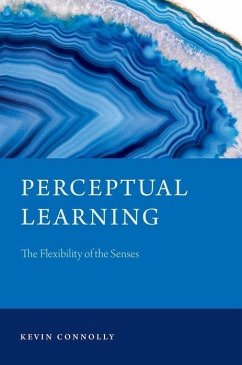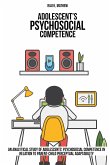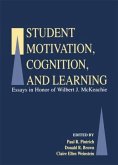- Gebundenes Buch
- Merkliste
- Auf die Merkliste
- Bewerten Bewerten
- Teilen
- Produkt teilen
- Produkterinnerung
- Produkterinnerung
This book uses recent evidence from psychology and neuroscience to show that perceptual learning is genuinely perceptual, rather than post-perceptual. It also offers a taxonomy for classifying cases in the philosophical literature.
Andere Kunden interessierten sich auch für
![An analytical study of adolescents' psychosocial competence in relation to parent-child perceptual adaptability. An analytical study of adolescents' psychosocial competence in relation to parent-child perceptual adaptability.]() Raji K MathewAn analytical study of adolescents' psychosocial competence in relation to parent-child perceptual adaptability.60,99 €
Raji K MathewAn analytical study of adolescents' psychosocial competence in relation to parent-child perceptual adaptability.60,99 €![Perceptual adaptability of teacher student relationship to student performance Perceptual adaptability of teacher student relationship to student performance]() Sreeja H. BPerceptual adaptability of teacher student relationship to student performance59,99 €
Sreeja H. BPerceptual adaptability of teacher student relationship to student performance59,99 €![Education of Selves Education of Selves]() Jack MartinEducation of Selves122,99 €
Jack MartinEducation of Selves122,99 €![The Oxford Encyclopedia of Educational Psychology The Oxford Encyclopedia of Educational Psychology]() The Oxford Encyclopedia of Educational Psychology496,99 €
The Oxford Encyclopedia of Educational Psychology496,99 €![How Learning Happens How Learning Happens]() Paul A KirschnerHow Learning Happens200,99 €
Paul A KirschnerHow Learning Happens200,99 €![The Action Learning Handbook The Action Learning Handbook]() Anne BrockbankThe Action Learning Handbook169,99 €
Anne BrockbankThe Action Learning Handbook169,99 €![Student Motivation, Cognition, and Learning Student Motivation, Cognition, and Learning]() Student Motivation, Cognition, and Learning203,99 €
Student Motivation, Cognition, and Learning203,99 €-
-
-
This book uses recent evidence from psychology and neuroscience to show that perceptual learning is genuinely perceptual, rather than post-perceptual. It also offers a taxonomy for classifying cases in the philosophical literature.
Hinweis: Dieser Artikel kann nur an eine deutsche Lieferadresse ausgeliefert werden.
Hinweis: Dieser Artikel kann nur an eine deutsche Lieferadresse ausgeliefert werden.
Produktdetails
- Produktdetails
- Verlag: Oxford University Press
- Seitenzahl: 272
- Erscheinungstermin: 22. Februar 2019
- Englisch
- Abmessung: 213mm x 142mm x 25mm
- Gewicht: 454g
- ISBN-13: 9780190662899
- ISBN-10: 0190662891
- Artikelnr.: 54797876
- Herstellerkennzeichnung
- Libri GmbH
- Europaallee 1
- 36244 Bad Hersfeld
- 06621 890
- Verlag: Oxford University Press
- Seitenzahl: 272
- Erscheinungstermin: 22. Februar 2019
- Englisch
- Abmessung: 213mm x 142mm x 25mm
- Gewicht: 454g
- ISBN-13: 9780190662899
- ISBN-10: 0190662891
- Artikelnr.: 54797876
- Herstellerkennzeichnung
- Libri GmbH
- Europaallee 1
- 36244 Bad Hersfeld
- 06621 890
Kevin Connolly is a cognitive scientist and philosopher who works on learning. His research focuses especially on perception-based learning, as found in experts from wine tasters to radiologists to bird watchers. He is currently an Assistant Professor of Psychology at Minerva Schools at KGI-a new university founded on the principles of the science of learning-where he plays a central role in curriculum design for the School of Social Sciences. Prior to Minerva he was an Andrew W. Mellon Postdoctoral Fellow at the University of Pennsylvania.
* PREFACE
* PART 1. THE NATURE OF PERCEPTUAL LEARNING
* I. HOW TO UNDERSTAND PERCEPTUAL LEARNING
* 1.1 Introduction
* 1.2 What Is Perceptual Learning?
* 1.3 A Taxonomy of Perceptual Learning Cases
* 1.4 The Offloading View of Perceptual Learning
* 1.5 Looking Ahead
* II. IS PERCEPTUAL LEARNING GENUINELY PERCEPTUAL?
* 2.1 Introduction
* 2.2 Skepticism about Perceptual Learning as Genuinely Perceptual
* 2.3 Introspective Evidence that Perceptual Learning Is Genuinely
Perceptual
* 2.4 Neuroscientific Evidence that Perceptual Learning Is Genuinely
Perceptual
* 2.5 Behavioral Evidence that Perceptual Learning Is Genuinely
Perceptual
* 2.6 Conclusion
* PART 2. THE SCOPE OF PERCEPTUAL LEARNING
* III. LEARNED ATTENTION AND THE CONTENTS OF PERCEPTION
* 3.1 Introduction
* 3.2 The Phenomenal Contrast Argument
* 3.3 The Attentional Reply to the Phenomenal Contrast Argument
* 3.4 The Blind Flailing Model of Perceptual Learning
* 3.5 A New Attentional Reply to the Phenomenal Contrast Argument
* 3.6 Learned Attention and the Offloading View
* IV. LEARNED ATTENTION II: SENSORY SUBSTITUTION
* 4.1 Introduction
* 4.2 Attentional Weighting in Distal Attribution
* 4.3 Latent Inhibition as a Kind of Learned Attention
* 4.4 Applying Principles of Attentional Training to Sensory
Substitution
* 4.5 Perceptual Learning and Perceptual Hacking
* 4.6 An Empirical Test for Determining the Nature of SSD Experience
* 4.7 Conclusion
* V. "CHUNKING" THE WORLD THROUGH MULTISENSORY PERCEPTION
* 5.1 Introduction
* 5.2 The Kind of Conscious Awareness We Have in Multisensory
Perception
* 5.3 Unitization as a Perceptual Learning Mechanism
* 5.4 Applying Unitization to Multisensory Cases
* 5.5 Objections and Replies
* 5.6 Unitization and the Offloading View
* 5.7 Conclusion
* VI. LEARNING TO DIFFERENTIATE PROPERTIES: SPEECH PERCEPTION
* 6.1 Introduction
* 6.2 The Phenomenal Contrast Argument for Hearing Meanings
* 6.3 The Argument from Homophones
* 6.4 The Role of Differentiation in Speech Perception
* 6.5 Why Perceptual Learning Does Not Support the View that We Hear
Meanings
* 6.6 The Offloading View and Speech Perception
* 6.7 Conclusion
* VII. LEARNING TO DIFFERENTIATE OBJECTS: THE CASE OF MEMORY COLOR
* 7.1 Introduction
* 7.2 Memory Color and Cognitive Penetration
* 7.3 A Brief Survey of Memory Color Studies
* 7.4 Why Memory Color Is Not a Mechanism for Color Constancy
* 7.5 Applying Differentiation to Memory Color
* 7.6 Memory Color and the Offloading View
* 7.7 Conclusion
* CONCLUSION: PERCEPTUAL LEARNING BEYOND PHILOSOPHY OF MIND
* ACKNOWLEDGEMENTS
* REFERENCES
* PART 1. THE NATURE OF PERCEPTUAL LEARNING
* I. HOW TO UNDERSTAND PERCEPTUAL LEARNING
* 1.1 Introduction
* 1.2 What Is Perceptual Learning?
* 1.3 A Taxonomy of Perceptual Learning Cases
* 1.4 The Offloading View of Perceptual Learning
* 1.5 Looking Ahead
* II. IS PERCEPTUAL LEARNING GENUINELY PERCEPTUAL?
* 2.1 Introduction
* 2.2 Skepticism about Perceptual Learning as Genuinely Perceptual
* 2.3 Introspective Evidence that Perceptual Learning Is Genuinely
Perceptual
* 2.4 Neuroscientific Evidence that Perceptual Learning Is Genuinely
Perceptual
* 2.5 Behavioral Evidence that Perceptual Learning Is Genuinely
Perceptual
* 2.6 Conclusion
* PART 2. THE SCOPE OF PERCEPTUAL LEARNING
* III. LEARNED ATTENTION AND THE CONTENTS OF PERCEPTION
* 3.1 Introduction
* 3.2 The Phenomenal Contrast Argument
* 3.3 The Attentional Reply to the Phenomenal Contrast Argument
* 3.4 The Blind Flailing Model of Perceptual Learning
* 3.5 A New Attentional Reply to the Phenomenal Contrast Argument
* 3.6 Learned Attention and the Offloading View
* IV. LEARNED ATTENTION II: SENSORY SUBSTITUTION
* 4.1 Introduction
* 4.2 Attentional Weighting in Distal Attribution
* 4.3 Latent Inhibition as a Kind of Learned Attention
* 4.4 Applying Principles of Attentional Training to Sensory
Substitution
* 4.5 Perceptual Learning and Perceptual Hacking
* 4.6 An Empirical Test for Determining the Nature of SSD Experience
* 4.7 Conclusion
* V. "CHUNKING" THE WORLD THROUGH MULTISENSORY PERCEPTION
* 5.1 Introduction
* 5.2 The Kind of Conscious Awareness We Have in Multisensory
Perception
* 5.3 Unitization as a Perceptual Learning Mechanism
* 5.4 Applying Unitization to Multisensory Cases
* 5.5 Objections and Replies
* 5.6 Unitization and the Offloading View
* 5.7 Conclusion
* VI. LEARNING TO DIFFERENTIATE PROPERTIES: SPEECH PERCEPTION
* 6.1 Introduction
* 6.2 The Phenomenal Contrast Argument for Hearing Meanings
* 6.3 The Argument from Homophones
* 6.4 The Role of Differentiation in Speech Perception
* 6.5 Why Perceptual Learning Does Not Support the View that We Hear
Meanings
* 6.6 The Offloading View and Speech Perception
* 6.7 Conclusion
* VII. LEARNING TO DIFFERENTIATE OBJECTS: THE CASE OF MEMORY COLOR
* 7.1 Introduction
* 7.2 Memory Color and Cognitive Penetration
* 7.3 A Brief Survey of Memory Color Studies
* 7.4 Why Memory Color Is Not a Mechanism for Color Constancy
* 7.5 Applying Differentiation to Memory Color
* 7.6 Memory Color and the Offloading View
* 7.7 Conclusion
* CONCLUSION: PERCEPTUAL LEARNING BEYOND PHILOSOPHY OF MIND
* ACKNOWLEDGEMENTS
* REFERENCES
* PREFACE
* PART 1. THE NATURE OF PERCEPTUAL LEARNING
* I. HOW TO UNDERSTAND PERCEPTUAL LEARNING
* 1.1 Introduction
* 1.2 What Is Perceptual Learning?
* 1.3 A Taxonomy of Perceptual Learning Cases
* 1.4 The Offloading View of Perceptual Learning
* 1.5 Looking Ahead
* II. IS PERCEPTUAL LEARNING GENUINELY PERCEPTUAL?
* 2.1 Introduction
* 2.2 Skepticism about Perceptual Learning as Genuinely Perceptual
* 2.3 Introspective Evidence that Perceptual Learning Is Genuinely
Perceptual
* 2.4 Neuroscientific Evidence that Perceptual Learning Is Genuinely
Perceptual
* 2.5 Behavioral Evidence that Perceptual Learning Is Genuinely
Perceptual
* 2.6 Conclusion
* PART 2. THE SCOPE OF PERCEPTUAL LEARNING
* III. LEARNED ATTENTION AND THE CONTENTS OF PERCEPTION
* 3.1 Introduction
* 3.2 The Phenomenal Contrast Argument
* 3.3 The Attentional Reply to the Phenomenal Contrast Argument
* 3.4 The Blind Flailing Model of Perceptual Learning
* 3.5 A New Attentional Reply to the Phenomenal Contrast Argument
* 3.6 Learned Attention and the Offloading View
* IV. LEARNED ATTENTION II: SENSORY SUBSTITUTION
* 4.1 Introduction
* 4.2 Attentional Weighting in Distal Attribution
* 4.3 Latent Inhibition as a Kind of Learned Attention
* 4.4 Applying Principles of Attentional Training to Sensory
Substitution
* 4.5 Perceptual Learning and Perceptual Hacking
* 4.6 An Empirical Test for Determining the Nature of SSD Experience
* 4.7 Conclusion
* V. "CHUNKING" THE WORLD THROUGH MULTISENSORY PERCEPTION
* 5.1 Introduction
* 5.2 The Kind of Conscious Awareness We Have in Multisensory
Perception
* 5.3 Unitization as a Perceptual Learning Mechanism
* 5.4 Applying Unitization to Multisensory Cases
* 5.5 Objections and Replies
* 5.6 Unitization and the Offloading View
* 5.7 Conclusion
* VI. LEARNING TO DIFFERENTIATE PROPERTIES: SPEECH PERCEPTION
* 6.1 Introduction
* 6.2 The Phenomenal Contrast Argument for Hearing Meanings
* 6.3 The Argument from Homophones
* 6.4 The Role of Differentiation in Speech Perception
* 6.5 Why Perceptual Learning Does Not Support the View that We Hear
Meanings
* 6.6 The Offloading View and Speech Perception
* 6.7 Conclusion
* VII. LEARNING TO DIFFERENTIATE OBJECTS: THE CASE OF MEMORY COLOR
* 7.1 Introduction
* 7.2 Memory Color and Cognitive Penetration
* 7.3 A Brief Survey of Memory Color Studies
* 7.4 Why Memory Color Is Not a Mechanism for Color Constancy
* 7.5 Applying Differentiation to Memory Color
* 7.6 Memory Color and the Offloading View
* 7.7 Conclusion
* CONCLUSION: PERCEPTUAL LEARNING BEYOND PHILOSOPHY OF MIND
* ACKNOWLEDGEMENTS
* REFERENCES
* PART 1. THE NATURE OF PERCEPTUAL LEARNING
* I. HOW TO UNDERSTAND PERCEPTUAL LEARNING
* 1.1 Introduction
* 1.2 What Is Perceptual Learning?
* 1.3 A Taxonomy of Perceptual Learning Cases
* 1.4 The Offloading View of Perceptual Learning
* 1.5 Looking Ahead
* II. IS PERCEPTUAL LEARNING GENUINELY PERCEPTUAL?
* 2.1 Introduction
* 2.2 Skepticism about Perceptual Learning as Genuinely Perceptual
* 2.3 Introspective Evidence that Perceptual Learning Is Genuinely
Perceptual
* 2.4 Neuroscientific Evidence that Perceptual Learning Is Genuinely
Perceptual
* 2.5 Behavioral Evidence that Perceptual Learning Is Genuinely
Perceptual
* 2.6 Conclusion
* PART 2. THE SCOPE OF PERCEPTUAL LEARNING
* III. LEARNED ATTENTION AND THE CONTENTS OF PERCEPTION
* 3.1 Introduction
* 3.2 The Phenomenal Contrast Argument
* 3.3 The Attentional Reply to the Phenomenal Contrast Argument
* 3.4 The Blind Flailing Model of Perceptual Learning
* 3.5 A New Attentional Reply to the Phenomenal Contrast Argument
* 3.6 Learned Attention and the Offloading View
* IV. LEARNED ATTENTION II: SENSORY SUBSTITUTION
* 4.1 Introduction
* 4.2 Attentional Weighting in Distal Attribution
* 4.3 Latent Inhibition as a Kind of Learned Attention
* 4.4 Applying Principles of Attentional Training to Sensory
Substitution
* 4.5 Perceptual Learning and Perceptual Hacking
* 4.6 An Empirical Test for Determining the Nature of SSD Experience
* 4.7 Conclusion
* V. "CHUNKING" THE WORLD THROUGH MULTISENSORY PERCEPTION
* 5.1 Introduction
* 5.2 The Kind of Conscious Awareness We Have in Multisensory
Perception
* 5.3 Unitization as a Perceptual Learning Mechanism
* 5.4 Applying Unitization to Multisensory Cases
* 5.5 Objections and Replies
* 5.6 Unitization and the Offloading View
* 5.7 Conclusion
* VI. LEARNING TO DIFFERENTIATE PROPERTIES: SPEECH PERCEPTION
* 6.1 Introduction
* 6.2 The Phenomenal Contrast Argument for Hearing Meanings
* 6.3 The Argument from Homophones
* 6.4 The Role of Differentiation in Speech Perception
* 6.5 Why Perceptual Learning Does Not Support the View that We Hear
Meanings
* 6.6 The Offloading View and Speech Perception
* 6.7 Conclusion
* VII. LEARNING TO DIFFERENTIATE OBJECTS: THE CASE OF MEMORY COLOR
* 7.1 Introduction
* 7.2 Memory Color and Cognitive Penetration
* 7.3 A Brief Survey of Memory Color Studies
* 7.4 Why Memory Color Is Not a Mechanism for Color Constancy
* 7.5 Applying Differentiation to Memory Color
* 7.6 Memory Color and the Offloading View
* 7.7 Conclusion
* CONCLUSION: PERCEPTUAL LEARNING BEYOND PHILOSOPHY OF MIND
* ACKNOWLEDGEMENTS
* REFERENCES








